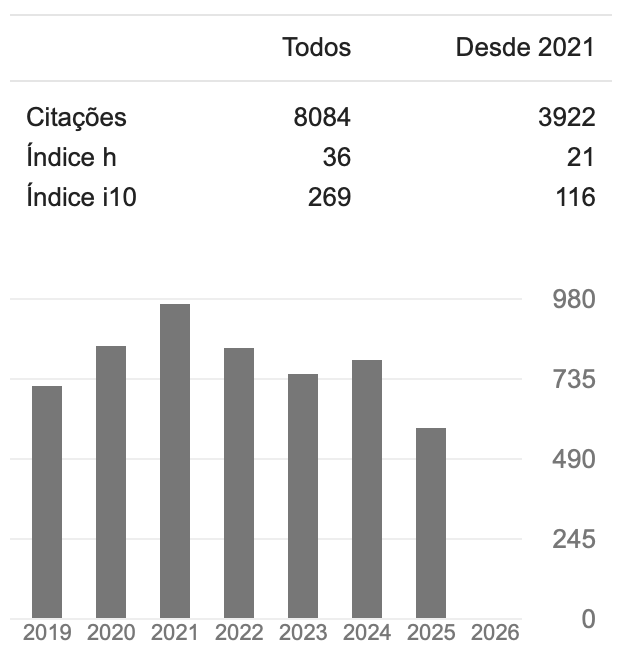Fatores relacionados à percepção do risco de adoecer por COVID-19 em adultos da Região Sudeste
DOI:
https://doi.org/10.17765/2176-9206.2022v15n2.e10420Palavras-chave:
COVID-19, Percepção, RiscoResumo
O objetivo do presente estudo foi identificar fatores relacionados à percepção do risco de adoecer por COVID-19 em adultos da Região Sudeste. Estudo transversal, websurvey, realizado com amostra de 2.477 residentes da Região Sudeste. Foi empregada a análise de correspondência múltipla para ilustrar graficamente as relações entre os padrões de respostas; e o teste t de student para comparação entre médias. Homens, com ensino médio e 40 anos ou mais de idade demonstraram percepção de risco baixo de adoecer pela COVID-19. A média mais elevada (2,08) da percepção de risco de adoecer foi a dos participantes que tiveram contato próximo com caso suspeito de COVID-19 (p<0,001). Conclui-se que as diferentes técnicas de análise utilizando medidas quantitativas permitiram evidenciar que a percepção de risco elevado de adoecer por COVID-19 relacionou-se com a experiência de contato próximo com caso suspeito da doença.Downloads
Referências
1. Bruin WB, Bennett D. Relationships Between Initial COVID-19 Risk Perceptions and Protective Health Behaviors: A National Survey. Am J Prev Med. 2020; 59(2). doi: 10.1016/j.amepre.2020.05.001.
2. Ye M, Lyu Z. Trust, Risk Perception and the Infection Rate of Diseases: Evidence from COVID-19 in China. Soc Sci Med. 2020; 265:113517. doi: 10.1016/j.socscimed.2020.113517.
3. Moniz MDA, Carmo CND, Hacon SDS, Ribeiro CRB, Dias RM. Health Risks Perception in the Context of the Construction Petrochemical complex in Brazil. Ambient Soc. 2019; 22. doi: 10.1590/1809-4422asoc0328vu19l4ao.
4. Souza CDF, Paiva JPS, Leal TC, Silva LF, Santos LG. Spatio temporal evolution of case fatality rates of COVID-19 in Brazil, 2020. J Bras Pneumol. 2020; 46(4):e20200208.
5. Instituto Brasileiro de Geografia e Estatística. IBGE Cidades [Internet]. 2020. Disponível em: https://cidades.ibge.gov.br/
6. Infantosi AFC, Costa JCGD, Almeida RMVR. Análise de Correspondência: bases teóricas na interpretação de dados categóricos em Ciências da Saúde. Cad Saúde Pública. 2014 mar; 30(3):473-86. doi: 10.1590/0102-311X00128513.
7. Chan JFW, Yuan S, Kok KH, To Wang Kelvin Kai, Chu H, Yang J.A familial cluster of pneumonia associated with the 2019 novel coronavirus indicating person-to-person transmission: a study of a Family cluster. Lancet. 2020 jan; 395(10223): 541-523. doi: 10.1016/S0140-6736(20)30154-9.
8. Lindemann IL, Simonetti AB, Amaral CP do, Riffel RT, Simon TT, Stobbe JC, et al. Percepção do medo de ser contaminado pelo novo coronavírus. J Bras Psiquiatr. 2021; 70(1):3-11. doi: 10.1590/0047-2085000000306.
9. Macinko J, Seixas BV, Woolley NO, Andrade FB, Costa MFL. Prevalence and characteristics of Brazilians aged 50 and over that received a doctor’s diagnosis of COVID-19: the ELSI-COVID-19 initiative. Cad Saúde Pública. 2020; 36(suppl 3). doi: 10.1590/0102-311x00190320.
10. Santos AKDSD, Moniz MDA, Louro TQ, Ribeiro YC, Carmo CND, Daher DV, et al. Tecnologias da Informação e Comunicação em tempos de COVID-19. Res Soc Dev. 2020 dez;9(11):e79891110493. doi: 10.33448/rsd-v9i11.10493.
11. Zanin GM, Gentile E, Parisi A, Spasiano D. A Preliminary Evaluation of the Public Risk Perception Related to the COVID-19 Health Emergency in Italy. Int J Environ Res Public Health. 2020 abr;17(9):3024. doi: 10.3390/ijerph17093024.
12. Vasconcellos-Silva P, Castiel L. COVID-19, as fake news e o sono da razão comunicativa gerando monstros: a narrativa dos riscos e os riscos das narrativas. Cad Saúde Pública. 2020 jul; 36: e00101920. doi:10.1590/0102-311X00101920.
13. Slovic P. The Psychology of frisk. Saúde e Soc. 2010 dez; 19(4): 731-747. doi: 10.1590/S0104-12902010000400002.
14. Campos MR, Schramm JMA, Emmerick ICM, Rodrigues JM, Avelar FG, Pimentel TG. Carga de doença da COVID-19 e de suas complicações agudas e crônicas: reflexões sobre a mensuração (DALY) e perspectivas no Sistema Único de Saúde. Cad Saúde Pública. 2020; 36(11). doi: 10.1590/0102-311x00148920.
15. Aquino EML, Silveira IH, Pescarini JM, Aquino R, Souza-Filho JA, Rocha AS, et al. Medidas de distanciamento social no controle da pandemia de COVID-19: potenciais impactos e desafios no Brasil. Ciên Saúde Colet. 2020 jun; 25:2423-446. doi: 10.1590/1413-81232020256.1.10502020.
16. Geldsetzer P. Use of Rapid Online Surveys to Assess People's Perceptions During Infectious Disease Outbreaks: A Cross-sectional Survey on COVID-19. J Med Internet Res 2020; 22(4):e18790. doi: 10.2196/18790.
17. Ministério da Saúde (BR). Protocolo de manejo clínico para o novo-coronavírus (2019-nCoV). Ministério da Saúde [Internet] 2020[acesso em 2021 Mar 20]. Disponível em: https://portalarquivos2.saude.gov.br/images/pdf/2020/fevereiro/11/protocolo-manejo-coronavirus.pdf.
18. Aarestrup FM. Imunopatologia da COVID-19 e suas implicações clínicas. Arq Asmas Alerg e Imunol. 2020 out; 4(2):172-80. doi: 10.5935/2526-5393.20200024.
19. Pan American Health Organization (PAHO). The Impact of COVID-19 on Mental, Neurological and Substance Use Services in the Americas: Results of a Rapid Assessment. Pan American Health Organization [Internet] 2020[cited 2021 Mar 20]. Disponível em: https://iris.paho.org/handle/10665.2/52999.
20. Morel APM. Negacionismo da Covid-19 e educação popular em saúde: para além da necropolítica. Trab Educ Saúde. 2021 jan;19(00315147). doi: 10.1590/1981-7746-sol00315.
21. Urrunaga-Pastor D, Bendezu-Quispe G, Herrera-Añazco P, Uyen-Cateriano A, Toro-Huaman chumo CJ, Rodriguez-Morales AJ, et al. Cross-sectional analysis of COVID-19 vaccine intention, perceptions and hesitancy across Latin America and the Caribbean. Travel Med Infect Dis. 2021;41:102059. doi: 10.1016/j.tmaid.2021.102059
Arquivos adicionais
Publicado
Como Citar
Edição
Seção
Licença
A submissão de originais para a revista Saúde e Pesquisa implica na transferência da Carta Concessão de Direitos Autorais, pelos autores, dos direitos de publicação digital para a revista após serem informados do aceite de publicação.A Secretaria Editorial irá fornecer da um modelo de Carta de Concessão de Direitos Autorais, indicando o cumprimento integral de princípios éticos e legislação específica. Os direitos autorais dos artigos publicados nesta revista são de direito do autor, com direitos da revista sobre a primeira publicação. Os autores somente poderão utilizar os mesmos resultados em outras publicações, indicando claramente a revista Saúde e Pesquisa como o meio da publicação original. Em virtude de tratar-se de um periódico de acesso aberto, é permitido o uso gratuito dos artigos, principalmente em aplicações educacionais e científicas, desde que citada a fonte. A Saúde e Pesquisa adota a licença Creative Commons Attribution 4.0 International.
A revista se reserva o direito de efetuar, nos originais, alterações de ordem normativa, ortográfica e gramatical, com vistas a manter o padrão culto da língua e a credibilidade do veículo. Respeitará, no entanto, o estilo de escrever dos autores. Alterações, correções ou sugestões de ordem conceitual serão encaminhadas aos autores, quando necessário. Nesses casos, os artigos, depois de adequados, deverão ser submetidos a nova apreciação. As opiniões emitidas pelos autores dos artigos são de sua exclusiva responsabilidade.


















